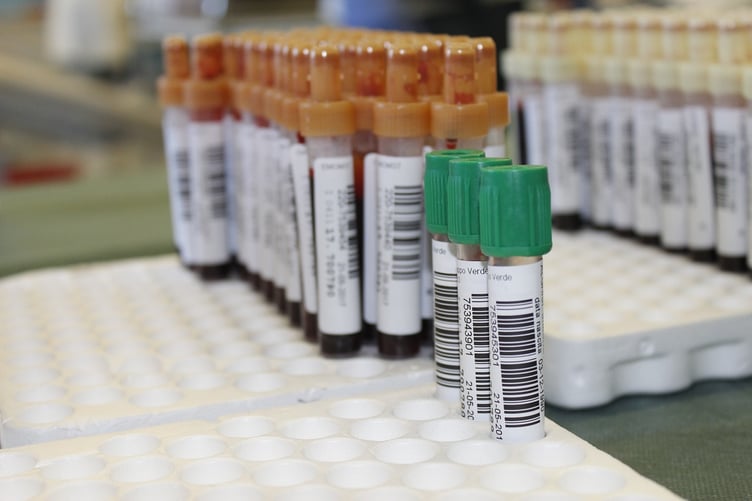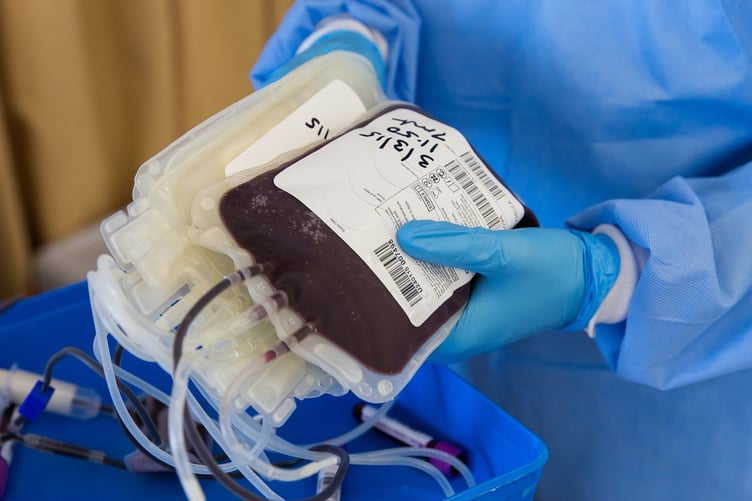Hywel Dda health board has apologised for ‘the hurt, pain and suffering caused to patients and their families and loved ones’ following the release of the Infected Blood Inquiry report.
The long-delayed report was published on Monday and says the infected blood scandal was ‘not an accident’ and its failures lie with ‘successive governments, the NHS and blood services’.
Sir Brian Langstaff, who chaired the investigation, said the calamity could “largely, though not entirely, have been avoided” – but successive governments and others in authority “did not put patient safety first”.
People suffering with haemophilia and other bleeding disorders were given blood infected with HIV and hepatitis viruses, during the 1970s and 1980s.
Up to 30,000 people are thought to have been affected and around 3,000 have died, with around 400 people in Wales known to have been infected, but this figure does not include others who have died or may not have known they were infected.

The 2,527-page report found authorities had exposed victims to unacceptable risks and covered up the NHS's biggest treatment disaster.
Deliberate attempts were made to conceal the disaster, including evidence of Whitehall officials destroying documents, the inquiry found.
Inquiry chairman Sir Brian Langstaff said: "What I have found is that disaster was no accident.
"People put their trust in doctors and the government to keep them safe and that trust was betrayed...
"That's why what I'm recommending is that compensation must be paid now."
On its website, Hywel Dda University Health Board, which replaced Ceredigion, Carmarthenshire and Pembrokeshire health board in 2009, has a page offering advice on those affected, on which it says: “Patients across the UK, including some who received blood products whilst receiving care from Hywel Dda University Health Board’s legacy organisations, were subsequently infected.
“We are sorry for the hurt, pain and suffering caused to patients and their families and loved ones.”
Commenting on the release of the report, Mark Henwood, Interim Medical Director at Hywel Dda University Health Board said: “On behalf of the health board and our legacy organisations who provided blood products in the delivery of care, we apologise for the hurt, pain and suffering caused to patients and their families and loved ones affected by the Infected Blood Inquiry.
“We have supported the Infected Blood Inquiry in an open and transparent way, sharing all relevant information and documentation. We also follow the Duty of Candour approach to being open, transparent, and honest with anyone who has questions about their care.
“If you received a blood transfusion or blood product before September 1991, or received an organ transplant before 1992, and you are concerned about your risk, you can access a free and confidential home test for Hepatitis C and HIV from Public Health Wales. Click here to visit the Public Health Wales website (opens in new tab). Alternatively, if you wish to discuss this with us, you can call us (Monday-Friday from 9am-5pm, excluding bank holidays) on 0300 303 8322 and choose option 1 or email [email protected]
“We will consider the Inquiry report and recommendations and provide any further updates as necessary to our patients.
“We would like to take this opportunity to assure people that routine testing is in place for blood and blood components and so the risk of an infected unit getting into the UK blood supply is extremely low. More information is available from the Welsh Blood service: Common questions about the Infected Blood Inquiry - Welsh Blood Service (welsh-blood.org.uk)”
Dwyfor Meirionnydd MP Liz Saville Roberts who has long campaigned for local families impacted by the infected blood scandal has described the release of the Infected Blood Inquiry's final report as "a significant step forward".
Mrs Saville Roberts has previously raised the case of Judith Thomas and Ruth Jenkins from Pen Llyn, whose late husband and brother Christopher, died in 1990 having been infected with contaminated blood and who have long campaigned for justice for those impacted by the scandal.
She said: "For both victims and their families, the publication of the Infected Blood Inquiry report represents an important step forward in their decades-long struggle for justice.
"This appalling miscarriage of justice has taken the lives of far too many and ruined many more. For too long the voices of those impacted by this scandal were silenced.
"This long anticipated report lays bare a catalogue of failures at every level which permitted the biggest treatment disaster in NHS history to go unchecked for so long.
"The release of this report also gives voice to victims and their families including Judith Thomas and Ruth Jenkins from my constituency - wife and sister of Christopher Thomas from Pen Llŷn who died from the effects of contaminated blood in 1990.
"Their steadfast campaigning and personal story is representative of countless others from across Wales and the UK who have waited for so long for the truth to be acknowledged.
"The contaminated blood scandal had a life-changing impact on tens of thousands of victims who were promised the hope of effective treatment. It can only be right that they and their loved ones can finally see the justice they have been denied for so long.
"As we near the passing the Bill, I will continue to do all that I can to hold the UK government to account so that victims and their families are awarded the compensation they so rightfully deserve, bringing some element of closure to the pain so many have unnecessarily endured."

Wales’ Health Secretary, Eluned Morgan MS, said: “This was the worst treatment scandal in the NHS. While it pre-dates devolution, as the Cabinet Secretary for Health and Social Care in Wales, I want to apologise to all those who were infected and have been affected by this terrible tragedy.
“I want to place on record my thanks to Sir Brian for his time and compassion shown during the inquiry. I also want to express my admiration for the strength shown by all those who gave evidence about their personal experiences and their families, many of whom campaigned for a public inquiry to take place for decades.
“It is right that their voices have been heard and I hope that survivors and their families feel assured that the inquiry has taken account of their evidence and provided answers to their questions and concerns.
“The Welsh Government provided access to our records as part of the inquiry and current and former officials and Ministers provided written and oral evidence as required.
“We remain committed to working on a four-nations basis to respond to the inquiry’s recommendations, with a view to achieving the best possible outcomes for beneficiaries and their families in Wales.
“The debate in the Senedd on 7 May confirmed our position in relation to the UK Government’s proposal to set up an arm’s length body to provide the vehicle by which compensation could be paid.
“Welsh Government officials will work with the UK Government to ensure Welsh beneficiaries and their families are recompensed in keeping with the inquiry’s interim report on compensation.
“Our Wales Infected Blood Support Scheme (WIBSS) continues to provide support for known beneficiaries and their families. For people who believe they may have been infected before 1992, we have worked with the Welsh Blood Service to help answer any queries they may have.
“I will provide further updates to the Senedd once we have had an opportunity to consider the inquiry’s recommendations.”
The inquiry also examined the role played by the Welsh Office and later the Welsh government.
Criticisms includeed “the inept, fragmented system by which the blood services of England and Wales operated" which led to infections, leading to deaths, illness and suffering.
The report also says: "There was no independent Welsh Office action concerning the risk of hepatitis from blood and blood products, although it was recognised as a hazard."
The reports adds that there were some discussions with the Welsh Office about Aids, independent of the DHSS, such as a meeting in May 1983 involving the chief medical officer for Wales and other experts but this "did not result in any action”.
After devolution, the Welsh government “largely echoed the approach taken by the DHSS in London"
It said criticism of the Government in England thus applied to Wales too – “except for the added criticism that policy on infected blood was determined with a lack of curiosity as to whether the English position was actually justified."
The report also criticises the influence and actions of Professor Arthur Bloom, who led the Cardiff Haemophilia Centre.
The report says his views 'overly influenced the way the DHSS viewed the emergence of Aids" and the threat posed to people with bleeding disorders'.
Prof Bloom, who died in 1992, was one of the leading experts in the field through the 1970s and 1980s.
The inquiry found he “shaped the views of the Haemophilia Society” who in turn made representations to the department.
“There was an uncritical acceptance of his line of thinking and a failure to probe his advice," said the inquiry report.
Prime Minister Rishi Sunak has promised compensation to the victims with some estimates costing that at £10 billion.
Speaking following the publication of the inquiry, Mr Sunak told the House of Commons: "Today’s report shows a decades-long moral failure at the heart of our national life.
"From the National Health Service to the civil service, to ministers in successive governments.
"At every level, the people and institutions in which we place our trust failed in the most harrowing and devastating way.
"They failed the victims and their families – and they failed this country.
"And the result of this inquiry should shake our nation to its core.
"Sir Brian finds an “attitude of denial” towards the risks of treatment.
"Worse, to our eternal shame, in a way that is hard to even comprehend, they allowed victims to become “objects for research”.
"Many – including children at Lord Mayor Treloar College - were part of trials, conducted without their or their parents’ knowledge or consent.
"Those with haemophilia or bleeding disorders were infected with HIV, Hepatitis C and Hepatitis B through NHS treatment through blood clotting products, such as Factor 8, including those who had been misdiagnosed and did not even require treatment.
"Many were treated disdainfully by healthcare professionals who made appalling assumptions about the origin of their infections.
"More than 3,000 people died without that truth.
"They died without an apology.
"They died without knowing how and why this was allowed to happen and they died without seeing anyone held to account.
"I want to make a wholehearted and unequivocal apology for this terrible injustice.
"On behalf of this and every Government stretching back to the 1970s, I am truly sorry.
"We will pay comprehensive compensation to those infected and those affected by this scandal.
"Whatever it costs to deliver this scheme, we will pay it."
Labour leader Sir Keir Starmer also apologised, describing it as one of the "gravest injustices" the country had seen and saying victims had "suffered unspeakably".
Hemophilia Wales welcomed the publication of the inquiry, saying: “Victims and families in Wales and across the UK have been campaigning to get to the truth about Infected Blood, for nearly 40 years
“Sir Brian Langstaff said their infections with HIV and or Hepatitis between 1970 and 1998 from infected blood and blood products was not an accident and there has been failures at individual, collective and systemic levels.”
Lynne Kelly, chair of Haemophilia Wales, added that people already knew a lot of what had happened but it needed to be put on public record and there was still "disbelief” at seeing it there in “black and white”.
The report recommendations include that the NHS in Wales should take steps to ensure that those “lessons to be learned” which relate to clinical practice should be incorporated into every doctors training.
It also said the operation of duties of candour in Wales should be reviewed.
It also recommends that a separate permanent memorial is considered in Wales for the victims, as well as in each of the UK nations.



-a-joyful-and-inclusive-c.jpeg?width=209&height=140&crop=209:145,smart&quality=75)

Comments
This article has no comments yet. Be the first to leave a comment.